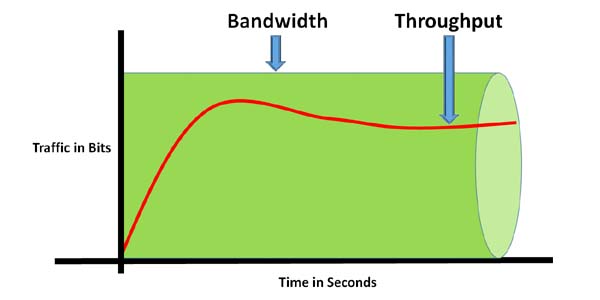Network Bandwidth and Throughput

Bandwidth and Throughput are two important basic networking terms in computer network. If you wish to be an expert network administrator, you must have better understanding about these two networking terms. As a network user, you should also have better understanding about network bandwidth and throughput so that you can get maximum output from your network service provider. In this article, I will explain about network bandwidth and throughput from very beginning. I hope, this article will enrich your networking concept.
What are Bandwidth and Throughput?
Bandwidth
In computer network, bandwidth is defined as the maximum number of bits that can flow through a network connection in a given period of time. The fundamental unit of network bandwidth is bits per second (bps).
An ISP network connection that specified a bandwidth of 1Mbps means that in one second, maximum 100000 bits can be transferred across this connection. The term bandwidth is normally used in internet broadband subscription plan. Normally a higher bandwidth subscription plan will cost more than that of a lower bandwidth subscription plan.
One thing to note is that even if you are subscribing a 1Mbps internet broadband plan, you may not get the full 1Mbps bandwidth when you are downloading a file from internet. 1Mbps is actually the bandwidth from your computer to your internet service provider (ISP). You can consider it is a road between your computer and your internet service provider (ISP) through which maximum 100000 bits can transfer per second if you purchase a 1Mbps subscription plan. Now, if you start downloading a file from any server, most of the time the data will need to go through many network devices before it reaches your ISP. So because of that, data may be slowed down along the way before coming to your computer. The term “throughput” is used to measure the exact number of bits that can flow through a network connection in a given period of time.
Throughput
In computer network, throughput is defined as the actual number of bits that flows through a network connection in a given period of time. Throughput is always less than or equal to bandwidth but can never exceed bandwidth. In a computer network, the throughput can be affected by many factors as listed below:
- Network congestion due to heavy network usage.
- Too many users are accessing the same server.
- Low bandwidth allocation between network devices.
- Medium loss of a computer network.
- Resources (CPU, RAM) of network devices.
So even if you have a high bandwidth to your ISP, it may not guarantee that you will have a high throughput due to the above factors.
Bandwidth and Speed Calculation
How to measure file size or file transfer rate
File size i.e. how big the file or how much space a file occupies in the hard disk is always measured in terms of KiloBytes (KBps that is uppers case “K” and upper case “B”). In computer science the upper case “K” stands for 1024. The number 1024 is computed from 210 (2 power 10). 2 denote the number of characters in binary numbering system which is used to store data in the disc (ones or zeros).
The file size stored in a disc is calculated as below formula:
0 or 1 = 1 bit
8 bit = 1 Byte
1024 Byte = 1 KB
1024 KB = 1 MB
1024 MB = 1 GB
1024 GB = 1 TB
How to measure data transfer rate
Data transfer rate over the networks (including the internet) is calculated in terms of bits per second usually kbps (lower case “k” and lower case “b”). The higher the kbps means more the bits transferred per second, more the speed, faster the network/connection. Here, k stands for 1000 that is 103 and b stands for bits.
The data transfer unit relation is as below:
1000 bits per second = 1 kbps
1000 kbps = 1 Mbps
1000 Mbps = 1 Gbps
ISP Bandwidth and Download Speeds
The most common confusion caused by the similarity of KBps and kbps is when it comes to internet bandwidth and downloads speed. People often complain that their ISP promised 512kbps connectivity but they are never able to download any file at 512KBps. They fail to notice the difference in case of the units and hence think their ISP is cheating them or offering them poor quality service. As mentioned earlier data transfer speeds are always calculated in terms of kilobits per second (kbps). So, an ISP connectivity of 512 kbps promises of transfer of data at the max 512 kilobits per second.
On the other hand, file size measure is always in Kilo Bytes and thus download speeds are always calculated based on how many Bytes per second are downloaded and hence Kilo Bytes per second. KBps and kbps are not interchangeable.
So, an internet connectivity of say 512kbps can never achieve a download speed of 512KBps. To calculate the maximum download speed of a “X kbps” connection, we need to use a simple formula as below.
Download KBps speed = ((kbps value * 1000)/8)/1024
So, if your ISP connectivity is 512kbps, then download KBps speed will be:
Download KBps speed= ((512*1000)/8)/24 = 62.5 KBps
Therefore theoretically an internet connection of 512kbps bandwidth can download at a maximum speed of 62.5KBps.
If you do not want to go through all the hassles of the above formula, just multiply the kbps value with a constant value i.e 0.1220703125 to get the KBps value. So, the download kbps value of 512kbps connectivity will be:
Download KBps value = 512*0.1220703125 = 62.5 KBps
In the below table I have mentioned some common internet bandwidth connectivity and the download speed respectively.
| Internet Connectivity | Download Speed (approximate) |
|---|---|
| 256kbps | 31.25 KBps |
| 512kbps | 62.5 KBps |
| 1Mbps ~ 1000kbps | 122.07 KBps |
| 2Mbps | 244.14 KBps |
| 5Mbps | 610.35 KBps |
Here, I have mentioned download speed as approximate because these will vary (always reduce) by 15-20% due to network signal loss, computer hardware overheads etc. So for realistic, real world figures always reduce 15 – 20% from the computed KBps downloads speeds.
Now I hope the confusion of kbps and KBps has cleared away. Just remember when you talk in terms of networks it is always bits per second (bps) and when you talk in terms of storage and files its always Bytes per second (Bps). And next time you will not complain when your 512 kbps connection does not give download speeds of 512 KBps because now you know why.
The two important terms in computer networking named bandwidth and throughput has been explained in this article. The difference of bandwidth and throughput and the formula to calculate download speeds against your purchased ISP bandwidth has also been shown here. I hope, you are now able to solve any confusion about network bandwidth and throughput. However, if you face any confusion about network bandwidth and throughput feel free to discuss in comment or contact with me from Contact page. I will try my best to stay with you.
Why not a Cup of COFFEE if the solution?


Hello sir
Thanks for the tuto you made us.
I needed your help. I a network with two wan. Wan1 and wan2. My concern is to make a configuration so that wan1 stays only for upload and wan2 for dawnload. In case one of two wan is down, I use wan which is up for upload and download. thank you in advance for your help